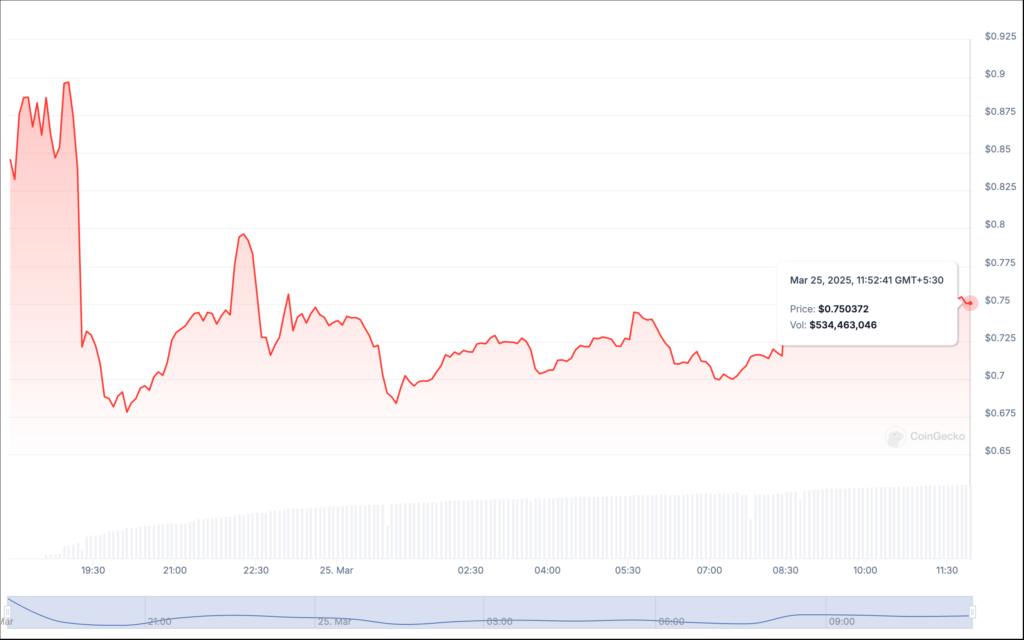Introduction to Nillion and NIL Token
Nillion, a pioneering private computation and storage network, launched its highly anticipated mainnet and native token, NIL, on Monday. Dubbed the “blind computer,” Nillion aims to revolutionize how data is processed and stored, emphasizing privacy and security.
Market Performance and Initial Reactions
Despite the excitement surrounding its debut, NIL’s market capitalization experienced a 12% decline within the first 24 hours. This drop occurred even as major exchanges, including South Korea’s Bithumb, listed the token and analysts expressed confidence in the project’s future. Initially, NIL was introduced with a total supply of 1 billion tokens, with 19.52% (or approximately 195.15 million NIL) airdropped to the community on launch day. This resulted in an initial market capitalization of just over $165 million.
As of the latest data, NIL’s market value has decreased to $144.93 million, trading at approximately 74 cents on prominent exchanges such as Binance, Gate.io, MEXC, and Bitget, according to Coingecko. In a positive development, Bithumb announced the listing of the NIL-Korean won trading pair shortly after the launch.
Understanding Nillion’s Blind Computing Technology
Nillion’s innovative approach centers around a decentralized platform designed for private, high-value data storage and computation. Its unique method parallels blockchain technology but introduces a significant difference: the use of Nil Message Compute (NMC). This allows computations to occur on encrypted data without the need for decryption, ensuring that no individual node or party has access to sensitive information.
The architecture of Nillion comprises a Coordination Layer called nilChain and a component known as Petnet. Petnet employs advanced privacy-enhancing technologies, including multi-party computation, fully homomorphic encryption, and trusted execution environments, to bolster data security. This “blind computing” method stands in stark contrast to traditional processing techniques, which necessitate decryption and expose sensitive data, such as personal health or financial information, to potential security risks.
Nillion’s Role in the AI Landscape
Nillion’s technology addresses critical data privacy and trust challenges prevalent in numerous sectors, including artificial intelligence (AI). Applications such as personal assistants, healthcare AIs, and private order books in decentralized finance are all potential beneficiaries of this innovative approach. Yau Teng Yan, founder and chief evangelist at research firm Chain of Thought, highlighted Nillion’s capacity to mitigate trust issues in AI. He stated, “Nillion is tackling AI’s biggest hurdle: trust. By weaving together cutting-edge privacy tech into a seamless backbone for AI, Nillion has the potential to become as fundamental to AI as SSL is to the web.” He further emphasized the need for Nillion to simplify usage for widespread adoption.
“The privacy revolution is just beginning,” Yan concluded, underscoring the significance of Nillion’s contributions.
Tokenomics Designed for Adoption
The NIL token serves as the governance cryptocurrency within the Nillion ecosystem, facilitating network fees for blind computations and transactions across both the Coordination Layer and Petnet. Additionally, NIL plays a crucial role in securing the network through staking and participation in the on-chain governance module.
Yan commented on the token’s economics, stating, “NIL’s token economics is designed for adoption. NIL will power the network, securing operations while driving burn-based demand as usage scales.” This strategic approach aims to foster growth and utilization of the Nillion network.



